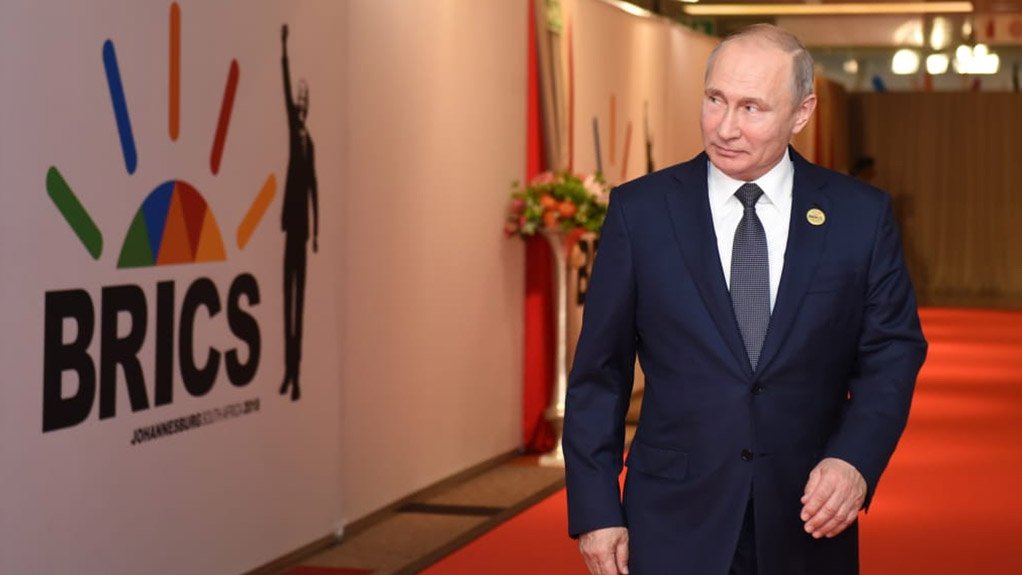Russian President Vladimir Putin will play host to Russia’s biggest gathering of world leaders since the invasion of Ukraine and use the Brics summit to show the US and its allies that he’s no pariah.
With Russian troops advancing in eastern Ukraine and evidence of growing war fatigue among some of Kyiv’s allies, the Kremlin is seizing its opportunity to cast Putin as standing up to the West in attempting to reshape the global order. The US and its Group of Seven partners dismiss the argument, though it’s a message that resonates with some countries of the emerging world.
Leaders of 32 countries, as well as top officials of regional organizations and United Nations Secretary-General Antonio Guterres, will attend the three-day summit starting Tuesday in Kazan, Kremlin foreign policy aide Yuri Ushakov told reporters.
Chinese President Xi Jinping, Indian Prime Minister Narendra Modi, and South African President Cyril Ramaphosa are due to join Putin alongside leaders of the new Brics members, Iran, Egypt, the United Arab Emirates and Ethiopia. Putin plans bilateral meetings with many of them, as well as with guests such as Turkish President Recep Tayyip Erdogan.
Brazilian President Luiz Inacio Lula da Silva on Sunday cancelled his plans to attend the summit after suffering a head injury in an accident at his home. Officials said he’ll participate by video link.
Even as the grouping attracts growing interest as a political and economic counterweight to the West, tensions are simmering over its direction and influence. Members are split over efforts to reduce reliance on the dollar as a global reserve currency, and on the wisdom of continued expansion of the group.
While Brics favours greater use of national currencies in bilateral trade, members including India reject attempts to promote China’s yuan as an alternative reserve currency.
Russia has produced a summit report outlining possible changes to cross-border payments among Brics countries aimed at circumventing the global financial system, though it acknowledges the proposals are mainly to promote discussion. They include developing a network of commercial lenders to conduct transactions in local currencies as well as establishing direct links between central banks.
Still, other Brics states don’t have the same incentives to escape the dollar-based system as Russia, whose economy is straining under sweeping sanctions imposed over Putin’s February 2022 invasion of Ukraine.
Russia wants to push for a de-dollarized payment system at the summit, which China regards as too ambitious, said Wang Yiwei, director of Renmin University’s Center for European Studies in Beijing.
The meeting is the first since Brics agreed to extend membership to six additional nations at last year’s summit in South Africa. But Argentina pulled out under its new President Javier Milei and Saudi Arabia has remained non-committal.
Nations ranging from Malaysia and Thailand to Nicaragua and NATO-member Turkey are eager to join Brics, though there’s unlikely to be an agreement on enlargement at the Russia summit.
India is against further expansion for now and supports a category of “Brics partner countries” without voting rights because it wants to steer the group away from becoming an anti-US body dominated by China and Russia, Indian officials said on condition of anonymity because the issue is sensitive.
Brazil and South Africa support India’s view, said officials in the two countries. Any bid to dilute South Africa’s influence by inviting Nigeria or Morocco into Brics will be resisted, said the South African officials.
The UAE completely rejects any attempt to present Brics membership as a sign that the Global South is in opposition to the West, according to a person familiar with the matter, asking not to be identified discussing internal policy. The Gulf state has very good relations with countries in the West including the US, according to another official.
Brics “expansion is a clear sign that the global balance of power is shifting,” said Alicia Garcia-Herrero, a Hong-Kong based economist who’s a senior research fellow at the Bruegel think tank. “But the future of the grouping is uncertain, given its heavy economic dependence on China and the deteriorating sentiment toward China among its members.”
Jim O’Neill, the Goldman Sachs economist who first coined the BRIC acronym in 2001, said expansion had made the group “highly political.” He told a forum in London in November: “I am not sure what fruitful purpose it serves other than being a club that the US is not a part of.”
Brics’ clout is growing. Its nine members account for 26% of the world economy and 45% of the world’s population versus the G-7’s 44% of global gross domestic product and 10% of its inhabitants. Brazil will host next month’s G-20 summit, following India’s presidency last year and ahead of South Africa’s in 2025.
Putin stayed away from last year’s Brics summit after South Africa warned it would have to comply with an arrest warrant against him for alleged war crimes in Ukraine issued by the International Criminal Court in March last year.
While the warrant has limited Putin’s travels, the gathering of so many foreign leaders in Russia underscores the readiness of many, particularly from Global South states, to continue meeting him in defiance of the US and its allies.
The fact so many countries want to join Brics indicates growing demand for international ties independent of the West, said Fyodor Lukyanov, head of the Council on Foreign and Defense Policy, a think tank that advises the Kremlin.
“For now, everyone just wants to see what it can gain from this,” he said.
EMAIL THIS ARTICLE SAVE THIS ARTICLE
To subscribe email subscriptions@creamermedia.co.za or click here
To advertise email advertising@creamermedia.co.za or click here











